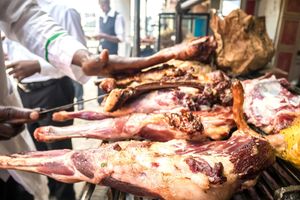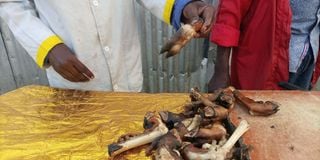
Boiled goat's hooves ready for sale in Kitengela, Kajiado County, on December 23, 2024.
In the dusk of December 23, 2024, in a back street of Kitengela town in Kajiado East Sub County, a man hurried into a hot soup stall and shouted “uza bonnet nusu na ugali chap chap”, an order that loosely translates as “half a goat's head cooked with ugali, quickly”.
In a moment, a man sitting at the edge of a makeshift table next to a smoky open kitchen slides a plate of the ordered delicacies onto the table, only to be stopped by the customer at the other end of the table.
This is how the delicacy is served here.
The customer was John Muia, a 31-year-old bus conductor on the Nairobi-Kitengela route, who jovially told Nation.Africa that this had been his trend for the past five years.
“I used to live in Nairobi Mukuru Kaiyamba slums before relocating to Kitengela two years ago to take up a bus conductor job. A half bonnet (goat head) accompanied with a slice of ugali and some vegetables has been my supper since my days in Mukuru slums,” Said Muia.
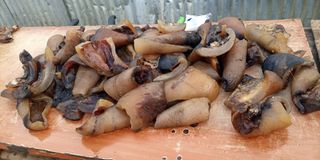
Boiled goat heads for sale in Kitengela, Kajiado County, on December 23, 2024.
For him, the food is cheap considering the skyrocketing prices of meat from butchers in the current hard economic times.
At least, the bachelor told Nation, he can afford one meal a day.
It will be the same for him on Christmas Day.
“I’m now okay until bedtime when we make our last trip around midnight. We are busy ferrying passengers travelling upcountry for Christmas. It cost me 140 bob for supper. Where can I get meat for the same price,” he says as he leaves, promising to pay the shopkeeper the next day.
Mr Muia's sentiments resonate with thousands of Kenyans, especially those living in urban centres.
Over the years, other meat cuts have become the preserve of the "rich", while the poor masses turn to hooves, chicken legs and tails to satisfy their appetite for meat. Typically, the delicacy is sold in back streets from makeshift stalls or in the dust along busy roads.
Nairobi City County and the neighbouring metropolitan counties of Kajiado, Kiambu and Machakos are synonymous with the 'alternative meat', though not exclusively, with dozens of outlets.
Nation.Africa has discovered that the delicacy is christened with pseudonyms that are only known between the seller and the customer.
In some outlets, goat's head is known as "bonnet", while goat and chicken legs are called "pistol".
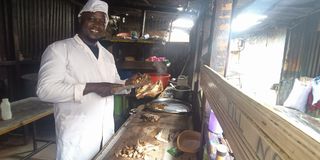
Mr Harun Mwangi, who mainly sells hooves and soup delicacies, prepares food at his business in Kitengela, Kajiado County, on December 23, 2024.
Most of the alternative meat consumers who spoke to the Nation attributed the rise in consumption of alternative meat to economic hardship, while a fraction seemed to believe in the myth that alternative meat protects against gout.
Ms Nancy Syombua, 40, a single mother of five whose story is one of survival and resilience to feed her family, said she and her family last ate meat on Christmas Day last year.
She told the Nation that she lives in abject poverty and her daily menial jobs haven't helped much.
“I live in a tiny semi-permanent room for a monthly rent of Sh1,500. I barely make enough to feed my children. On a lucky weekend, I can only manage to sell chicken legs or goat hooves on the street,” she says.
“For some of us, butchery is for the rich. Huwa tunakula kwa macho.”
Harun Mwangi, 35, told Nation.Africa that he has been running an alternative meat shop in Kitengela town since 2007, selling parts that are not usually found in other butcheries. And the number of customers has been growing by the day.
"Nowadays, I sell between 50-60 goat heads and dozens of hooves every day, but I am still unable to meet the demand of my customers. Some families order in advance," he adds.
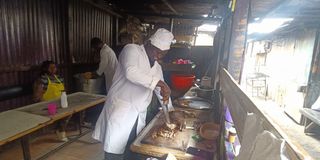
Mr Harun Mwangi, who mainly sells hooves and soup delicacies, prepares food at his business in Kitengela, Kajiado County, on December 23, 2024.
For the owner, the cost of meat on top of the high cost of living has left most Kenyans with few options.
According to the menu pinned to the wall of the outlet in the backstreet of Kitengela town, a full head sells for Sh300, three-quarters of a head for Sh220 and a quarter head for Sh80. The accompaniment is charged separately.
A spot check in the town revealed that a cup of soup sells for between Sh10 and Sh20, a pair of boiled goat hooves for Sh20 and a pair of chicken legs for Sh10.
In the satellite towns of Kajiado, including Ngong, Kiserian, Ong'ata Rongai and Kitengela, a kilogramme of beef sells for at least Sh650 compared to Sh450 five years ago.
A kilogramme of mutton and pork sells for at least Sh830 and Sh300 respectively.
Mr John Mwangi, a butcher in Kitengela town, told the Nation on Monday that the number of walk-in customers had dropped significantly over the past few years.
“The number of walk-in customers, who used to buy even on credit, has reduced significantly. Even this meat has become a luxury for the few in society,” Mwangi said.
According to veterinarian Samuel Kahariri, eating hooves, chicken legs and tails has no side effects on the consumer's body, adding that in some communities they don't even skin the animals or remove the hooves.
“There is no harm to consumers. However, hygiene is paramount in handling and consumption,” said Dr Kahariri.

